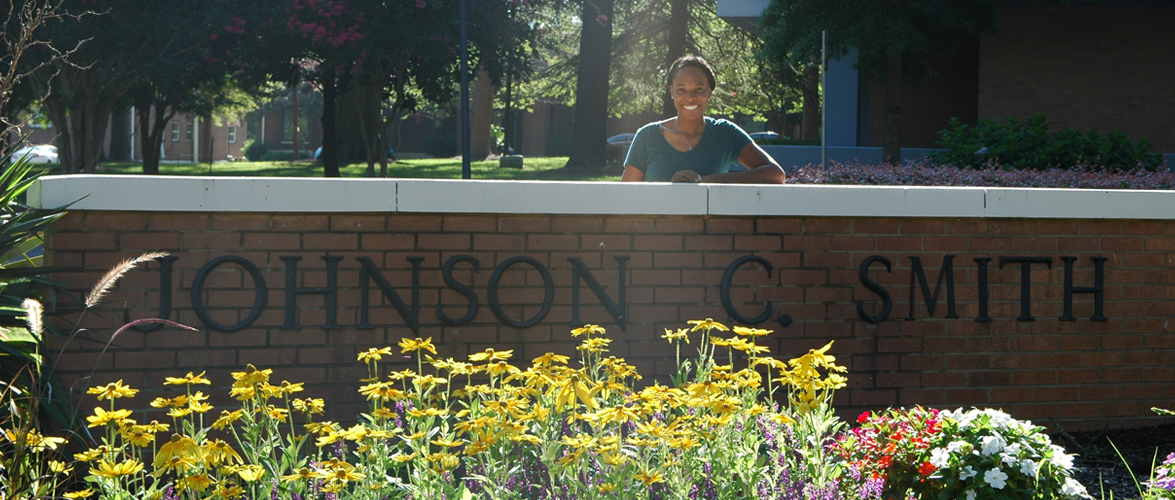Kameron Sheats: An HBCU Tribute
This story was published September 12, 2022 as an article in CDC Connects, Story Manager: Eljay Vaughn.

In her freshman year at Mt. Holyoke College in South Hadley, Massachusetts, Kameron Sheats was thriving. She was making good grades and adjusting to being one a few young Black women in a predominately White academic environment —just as she always had. But as she thought about the future, she realized that the time to experience the world in the context of a nurturing, Black academic setting would not come again. So she made a plan: She would apply to an HBCU in the South.
Kameron, a behavioral scientist in NCIPC’s Division of Violence Prevention, boarded a Greyhound bus to Charlotte, North Carolina, to visit Johnson C. Smith University (JCSU). She didn’t know anyone, and she hadn’t booked a hotel room, so she planned to meet with the admissions team and get back on a bus headed back to South Hadley. That plan went awry—in the best possible way.
The members of the admissions team insisted she stay for several days to experience life at JCSU. They connected her with two campus ambassadors, arranged for her to lodge in a dorm room, gave her meal tickets, and even made sure she got to a mall to get clothes and items she needed. Even more, by the end of her visit, the about-to-be former Mt. Holyoke student had been admitted and had a financial aid package. Needless to say, she finished her freshman year in Massachusetts and headed south.
She explains, “It worked out really well and speaks to the HBCU experience and the nurturing HBCUs provide.”
Excited about the journey, Kameron realized that as a transfer student, she may have missed out on the bonding that often takes place during freshman year, but she need not have worried. “It was a communal and familial atmosphere that felt like home,” she recalls. “Right away, I felt like I could fit in.”
And fit she did. At HBCUs, Kameron points out, people share a similar cultural affinity, but there is diversity even within. People come from all over the country and world and bring with them a wealth of experiences and interests that make them unique. Kameron found her social niche and quickly earned a reputation for being a promising student.
Kameron gives a lot of credit to her professors for her success, pointing out that it was Dr. Ruth Greene, who saw Kameron’s drive and self-motivation and made a decision to nurture it. Dr. Greene advised Kameron that she needed summer research experience and helped to complete applications and write essays.
“She picked me up and took me to her house, and we sat at her kitchen table until the applications were done.”
Accepted into several summer programs, Kameron chose the University of California at Riverside, where she worked on a project focused on racial and ethnic identity and their impact of African American student success. From there, she had at least one research experience each summer. Of Dr. Greene, she says, “She gave me the blueprint, and I took it from there.”
It is this type of excellence among HBCU faculty that Kameron says many overlook. She offers, “The immensely talented faculty that return to HBCUs to pour into students are fervent about preparing them for success. It is a privileged position to assume a PWI (predominately white institution) provides better academic support.” Kameron adds that the care and concern for students, like that shown by Dr. Green, make all the difference. There’s great value, she says, in “gaining independence while still under the cover and nurture HBCUs provide.”
It was cover and nurture that propelled Kameron forward when she aspired to become a Fulbright scholar. Not knowing that she needed the support of the institution, she simply submitted her application. When the Fulbright committee contacted JCSU, the administration rallied behind her, putting in place a mentor to help make her the institution’s first awardee of the prestigious scholarship.
And if that first summer research experience taught her nothing else, it impressed upon her the impact of identity on success. She emphasizes, “Don’t underestimate the value of identity formation as a foundation for education.”
Since then, Kameron has done what so many HBCU alumni do: leverage the education they receive to make a difference in their respective disciplines, communities, and the world. Since graduating from JCSU, Kameron has earned a master’s and doctoral degrees in clinical psychology from the University of Georgia and completed graduate and post-graduate-level programs at Howard University and Morehouse School of Medicine, also HBCUs. Now, she embraces opportunities to mentor undergraduate and graduate students—at all times modeling the care and nurture she received during her days at Johnson C. Smith University, her HBCU home away from home.